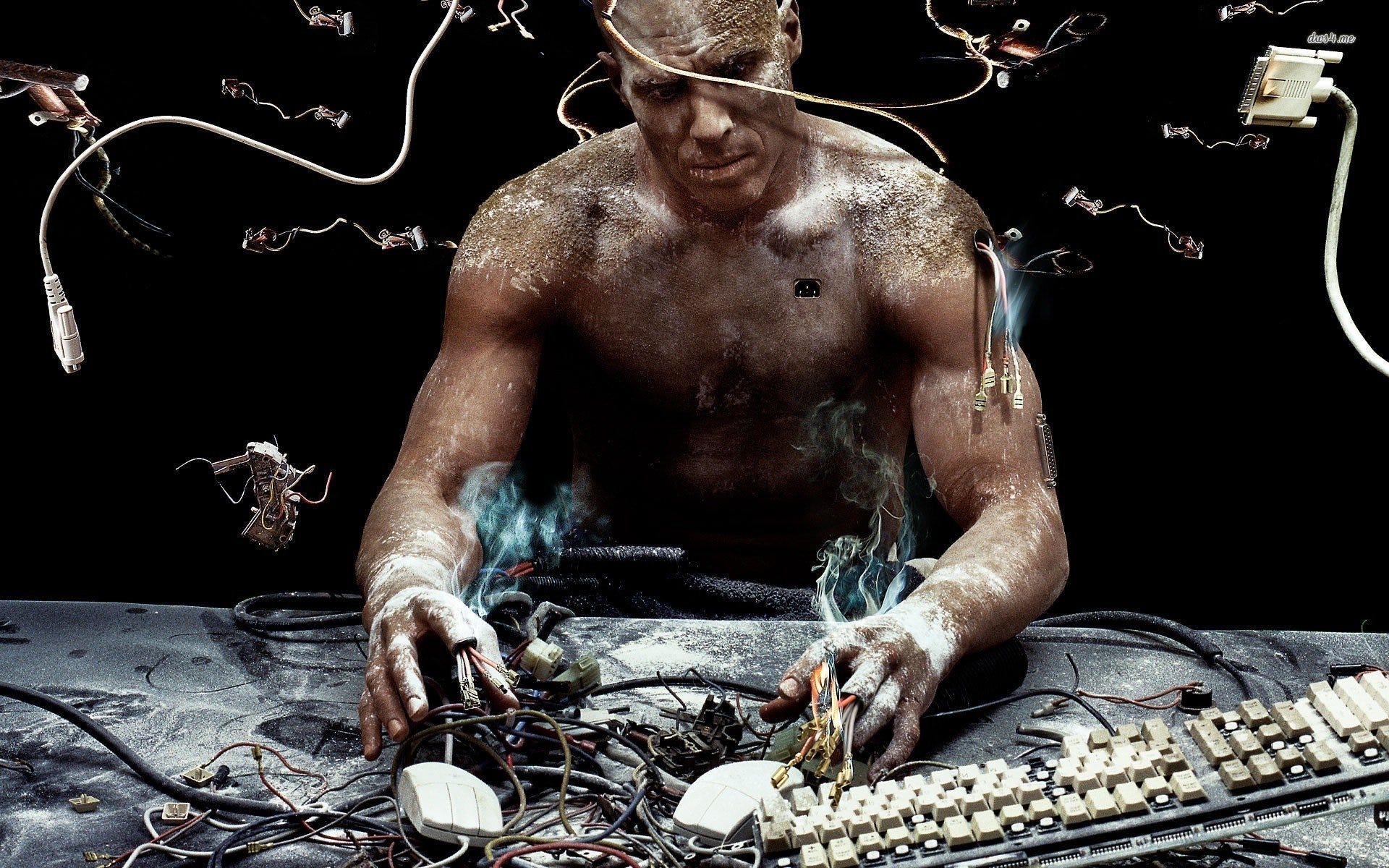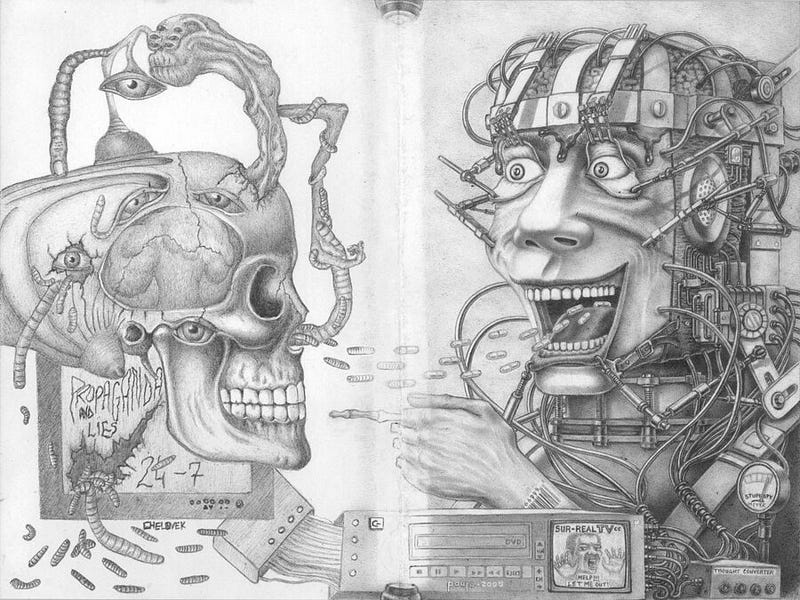
“I visualise a time when we will be to robots what dogs are to humans, and I’m rooting for the machines.” — Claude Shannon (“the father of information theory”)
Author and Historian, Yuval Noah Harari predicts that just as the industrial revolution created the working class, the AI revolution will create a “useless class”. This Thursday Thought posits that technology will be responsible for this shift, however, humans are responsible for not expanding our mental capabilities, we are not even giving ourselves a chance to compete. Why? We are handing the responsibility for thinking, processing information, and making key decisions over to machines.
A time will come when machines will surpass our cognitive abilities as robots have done with our physical abilities. Here, we may need to use AI to augment ourselves to keep pace with it. We call this intelligence amplification, or IA, first proposed in the 1950s and 1960s by cybernetics and early computer pioneers. Perhaps as Elon Musk predicts, “If Humans Are to Survive, We Must Merge With Machines”. In all cases, we must do what is in our control to give ourselves the best chances to compete in a transformed world. Social media, entertainment and tech distraction are not doing us any favours; we are allowing our cognitive capabilities to atrophy. Instead of intelligence amplification, we experience intelligence deterioration.
Brain Atrophy (Cerebral Atrophy)

Muscle atrophy is a decrease in muscle mass; it can be a partial or complete wasting away of muscle and is most commonly experienced when persons suffer temporary disabling circumstances such as being restricted in movement and/or confined to bed as when hospitalised. When a muscle atrophies, this leads to further muscle weakness.
When you injure your knee, you experience atrophy in the surrounding muscles of the knee. This leads to further imbalance and compensation by other muscles, as they can no longer work in unison. The imbalance leads to tightness and further injury and pain. If we do not rectify the initial weakness, then cascading deterioration is the result.
Brain atrophy is the loss of brain cells called neurons. Atrophy also destroys the connections that help the cells communicate. As with muscle atrophy, brain atrophy can happen through traumatic injury or through cognitive illnesses such as dementia. Digital dementia happens when we increasingly depend on algorithms and computers to do what we once did; eventually, we forget how to perform the skill. Let’s look at this next.
Digital Dementia

In “The Phaedrus”, written by Plato, there is a dialogue between Plato and Socrates. In a discussion about writing; Socrates rebukes the God who introduced writing saying: “For this invention will produce forgetfulness in the minds of those who learn to use it, because they will not practice their memory. You have invented an elixir not of remembering, but of reminding; and you offer your pupils the appearance of wisdom, not true wisdom.” Plato was talking about writing negatively impacting wisdom. Apart from signing documents when do you physically write nowadays? Apart from sending emails, when do you digitally write nowadays? Apart from reading a work-related paper, when do you think nowadays? When we no longer use the skill, we lose it. Our brains are neuroplastic, which means we can shape our brains for the positive and the negative.
“Take Google Maps or Waze. On the one hand, they amplify human ability — you are able to reach your destination faster and more easily. But, you are shifting the authority to the algorithm and losing your ability to find your own way.” — Yuval Noah Harari
In a five-year study focused on London taxi drivers, researchers took intermittent scans of the taxi drivers’ brain structures. The goal of the study was to measure their performance on memory tasks as they drove the streets of London (in the days before digital maps such as Google and Waze). The researchers found an increase in grey matter — the nerve cells in the brain where processing takes place — in the hippocampus. The cab drivers’ brain structure had adapted to how they used their brains. To earn their licenses, taxi drivers in training spent three to four years driving around the city on mopeds, memorising over 25,000 streets within a 10-kilometre radius of Charing Cross train station.
If you compare how taxi drivers navigate a city to how bus drivers do so, it makes sense that taxi drivers experience cognitive growth, while bus drivers do not. Taxi drivers must figure out the best and fastest routes, taking into account everything from time of day to traffic jams. Meanwhile, bus drivers take pre-defined, never-changing route, so their brain does not adapt; it may even atrophy.
Therefore, it is good for us to change our routines, seek varied experiences and learn continuously. Unfortunately, for many of us, this is not our reality. Many follow a pre-defined routine that starts with checking our social media feed and ends the same way. Netflix founder and CEO Reed Hastings once said that Netflix is not competing with Amazon or YouTube but with the human need for sleep. Hasting said: “You know, think about it, when you watch a show from Netflix and you get addicted to it, you stay up late at night. We’re competing with sleep, on the margin. And so, it’s a very large pool of time.”
Many of us persist in jobs that do not nourish us and use a cocktail of mind-numbing TV, social media, and digital news as an antidote. Unfortunately, this antidote has side effects, which manifest as focus problems, attention deficits and further cognitive decline. Digital pollution and poor digital habits prevent us from reaching our potential. If we do not address this now, future generations will suffer the consequences. It will be difficult to keep pace with the increasing prevalence of artificial intelligence as we stand today, if we allow our attention and focus decline further, it will be even more difficult. We discuss this further on the latest Innovation Show with Søren Kenner.
The 1% will become Gods

Most of the world’s wealth belongs to a concentrated group of individuals. This group enjoys early access to the latest high-end products and technologies. What happens when the first models of Elon Musk’s neural link or technology that can enhance cognitive abilities come onto the market? Technology always starts out expensive and available to those who can afford it. When the 1% gain access to such intelligence amplification, they will surpass the masses. Their early access to and affordability of this technology will create a cognitive gap besides the wealth gap. When the technology merges with their human abilities evolves at an exponential rate, we do not understand how far or where this will bring them, perhaps to a God-like state. One thing is sure, if we continue to atrophy on social media and continue to support a redundant education system built for the industrial revolution, there is no way we will survive in the AI revolution. The gap will continue to widen, AI will continue to evolve, and the common man rendered “useless”, maybe.
The purpose of this Thursday Thought is to raise awareness of this possible future. I hope it succeeds.
The challenge is to control our tech habits and that is the focus of this week’s Innovation show with Søren Kenner. Episode 174 is: “Offline: Free Your Mind from Smartphone and Social Media Stress” with Søren Kenner.
Our guest has sparked an international debate by revealing the “mind hacks” Facebook, Apple, Google, and Instagram use to get you and your children hooked on their products.
In Offline, he delivers an eye-opening research-based journey into the world of tech giants, smartphones, social engineering, and subconscious manipulation. This provocative work shows you how digital devices change individuals and communities for better and worse.
A must-read if you or your kids use smartphones or tablets and spend time browsing social networks, playing online games or even just browsing sites with news and entertainment.
Learn how to recognise ‘mind hacks’ and avoid the potentially disastrous side-effects of digital pollution. Unplug from the matrix. Learn digital habits that work for you.
We talk:
- The Impact of Technology on the Brain
- Digital Fragmentation Syndrome
- The Tsunami of Technology Transformation
- Human Cognition
- Neural Pruning
- Hormonal Triggers
- Social Comparison
- Addictive Design
- BJ Fogg and Captology
- Online Selling
- Cambridge Analytica
- Data
- Online Marketing
- Insidious Plays
- Confirmation Bias
- FLOW and Life Stories
More about Søren here: